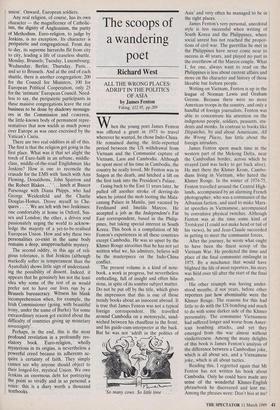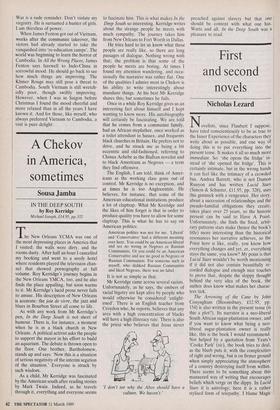The scoops of a wandering poet
Richard West
ALL THE WRONG PLACES: ADRIFT IN THE POLITICS OF ASIA by James Fenton
Viking, £12.95, pp.269
When the young poet James Fenton was offered a grant in 1973 to travel wherever he wanted, he chose Indo-China. He remained during the little-reported period between the US withdrawal from Vietnam and the Communist capture of Vietnam, Laos and Cambodia. Although he spent most of his time in Cambodia, the country he really loved, Mr Fenton was in Saigon at the death, and hitched a lift on the first tank into the President's Palace.
Going back to the East 11 years later, he pulled off another stroke of derring-do when he joined the mob looting the Mala- canang Palace in Manila, just vacated by Ferdinand and Imelda Marcos. He accepted a job as the Independent's Far East correspondent, based in the Philip- pines, but taking special interest in South Korea. This book is a compilation of Mr Fenton's experiences in all these countries except Cambodia. He was so upset by the Khmer Rouge atrocities that he has not yet written what we, his admirers, believe will be the masterpiece on the Indo-China conflict.
The present volume is a kind of note- book, a work in progress, but nevertheless enthralling, full of insight and often hila- rious, in spite of its sombre subject matter. Do not be put off by the title, which gives the impression that this is one of those trendy books about an innocent abroad. It is true that James Fenton was not a typical foreign correspondent. He travelled around Cambodia on a motorcycle, sand- wiched between his chauffeur in the front, and his guide-cum-interpreter at the back. But he was not 'adrift in the politics of
'So many cows. So little time. .
Asia' and very often he managed to be in the right places.
James Fenton's very personal, anecdotal style is less successful when writing of South Korea and the Philippines, where social unrest has not reached the propor- tions of civil war. The guerrillas he met in the Philippines have never come near to success in 40 years, and played no part in the overthrow of the Marcos couple. What I, for one, always want to read on the Philippines is less about current affairs and more on the character and history of those likeable but forlorn people.
Writing on Vietnam, Fenton is up in the league of Norman Lewis and Graham Greene. Because there were no more American troops in the country, and only a handful of foreign journalists, Fenton was able to concentrate his attention on the indigenous people, soldiers, peasants, stu- dents and monks. In contrast to books like Dispatches, by and about Americans, All the Wrong Places, has little about the foreign intruders.
James Fenton spent much time in the western part of the Mekong Delta, near the Cambodian border, across which he strayed (and was lucky to get back alive). He met there the Khmer Krom, Cambo- dians living in Vietnam, who hated the Khmer Rouge. In the winter of 1974-75, Fenton travelled around the Central High- lands, accompanied by an alarming French photographer, who was a communist of the Albanian faction, and used to make Marx- ist speeches in Vietnamese, accompanied by convulsive physical twitches. Although Fenton was at the time some kind of Trotskyist (I could not make head or tail of his views), he and Jean-Claude succeeded in getting to meet the communist forces.
After the journey, he wrote what ought to have been the finest scoop of the Vietnam War. He predicted the time and place of the final communist onslaught in 1975. By a mischance that would have blighted the life of most reporters, his story was held over till after the start of the final push. His other triumph was having under- stood months, if not years, before other reporters just how abominable were the Khmer Rouge. The reasons for this had little to do with the US bombing and much to do with some darker side of the Khmer personality. The communist Vietnamese had suffered longer and worse from Amer- ican bombing attacks, and yet they emerged from the war almost without vindictiveness. Among the many delights of this book is James Fenton's analysis of the difference between a Cambodian joke, which is all about sex, and a Vietnamese joke, which is all about tactics.
Reading this, I regretted again that Mr Fenton has not written his book about Cambodia. Only he could have made any sense of the wonderful Khmer-English phrasebook he discovered and lent me. Among the phrases were: Don't hiss at me! War is a rude reminder. Don't violate my virginity. He is surnamed a hunter of girls. I am thirstless of power.
When James Fenton got out of Vietnam, weeks after the communist takeover, the victors had already started to take the vanquished into 're-education camps'. The world was beginning to learn the horror of Cambodia. In All the Wrong Places, James Fenton says farewell to Indo-China in sorrowful mood. He should go back to see how much things are improving. The Khmer Rouge may still pose a threat to Cambodia. South Vietnam is still wretch- edly poor, though swiftly improving. However, when I was in Saigon before Christmas I found the mood cheerful and more relaxed than in all the years I have known it. And for those, like myself, who always preferred Vietnam to Cambodia, a visit is pure delight.



























































 Previous page
Previous page